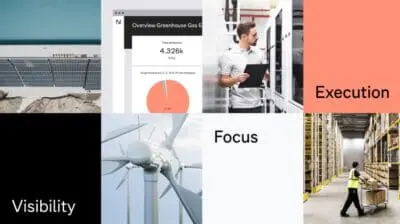3 reasons to reduce value chain emissions now

Reducing your business’s climate impact does more than fight climate change – it also helps you meet business objectives.
With value chain emissions accounting for around 90% of the average business’s carbon footprint, it’s plain to see how the climate benefits when businesses reduce those emissions.
But what some businesses may not know is that there are also significant opportunities to be seized by calculating and reducing value chain emissions.
Below are three of those opportunities, explained.
Why reduce value chain carbon emissions?
Stay ahead of regulations
Regulators are increasingly realizing the importance of requiring businesses to disclose carbon emissions, including in the value chain.
The EU’s CSDDD takes aim at value chains, ensuring that companies both inside and outside the EU address the impact of their suppliers – including mandating that large businesses have net-zero plans. Another EU legislation, CSRD, requires nearly 50,000 companies to disclose their value chain emissions.
Similarly, the US SEC (Securities and Exchange Commission) has unveiled a regulation proposal that would require public companies to disclose emissions, including scope 3 emissions.
By starting to engage your value chain in carbon accounting and reduction today, you ensure that you stay compliant now and in the future.
It’s good business
Customers, employees, and investors are increasingly concerned with a company’s record on climate change. Appease them by making demonstrable and impactful reductions to your carbon footprint – and for most businesses, the biggest reductions to be found are in the value chain.
In addition to meeting increasing demand for sustainability, your business can also mitigate risk by taking climate action. Emission-intensive parts of your value chain face greater risk, whether from tightening regulations or the rising cost of fossil fuel. Jump-starting your net zero journey by addressing your largest value chain emissions gives you a competitive advantage.
Make meaningful progress on climate change
A recent IPCC report emphasizes that reaching net zero requires “coordinated action throughout value chains.”
Because around 90% of a company’s emissions are typically in the value chain (also called scope 3), value chain engagement can lead to a substantial reduction in total emissions.
Moreover, by encouraging your suppliers to reduce emissions, you’re also helping other companies that use those suppliers – creating knock-on decarbonization effects throughout the economy, as demonstrated in Normative’s Carbon Network.
Reducing value chain emissions for large enterprises: a practical guide
Get the free guide
Getting started
It can seem daunting to begin reducing value chain emissions, especially for large businesses with complicated value chains.
To help businesses self-start, we’ve developed a free guide for enterpise business to calculate and reduce their value chain emissions.
But your business doesn’t have to go on this journey alone. Book a demo with Normative to learn how we enable you to calculate your full carbon footprint, identify hotspots, and engage with suppliers to reduce emissions.
Empower your business to reduce value chain emissions
Normative guides you along the full process of reducing value chain emissions, from initial calculation to supplier engagement.
FAQs
Frequently asked questions about reducing value chain emissions.
By reducing its value chain emissions your business can stay compliant with current and future legislation, seize business opportunities, and make a positive contribution to the global effort to combat climate change.
Reducing value chain emissions can be a complicated process. The first step is to calculate your full emissions. To help guide businesses along the way, we have created a free guide for business to calculate and reduce their value chain emissions.











